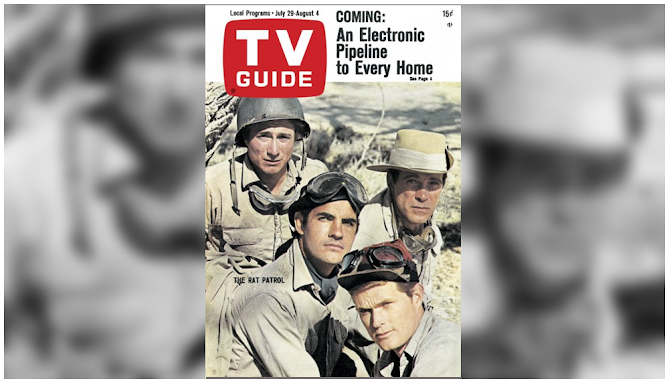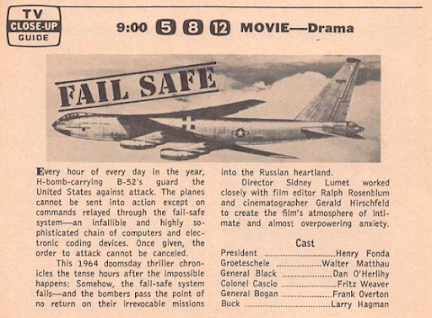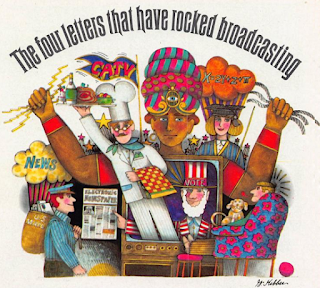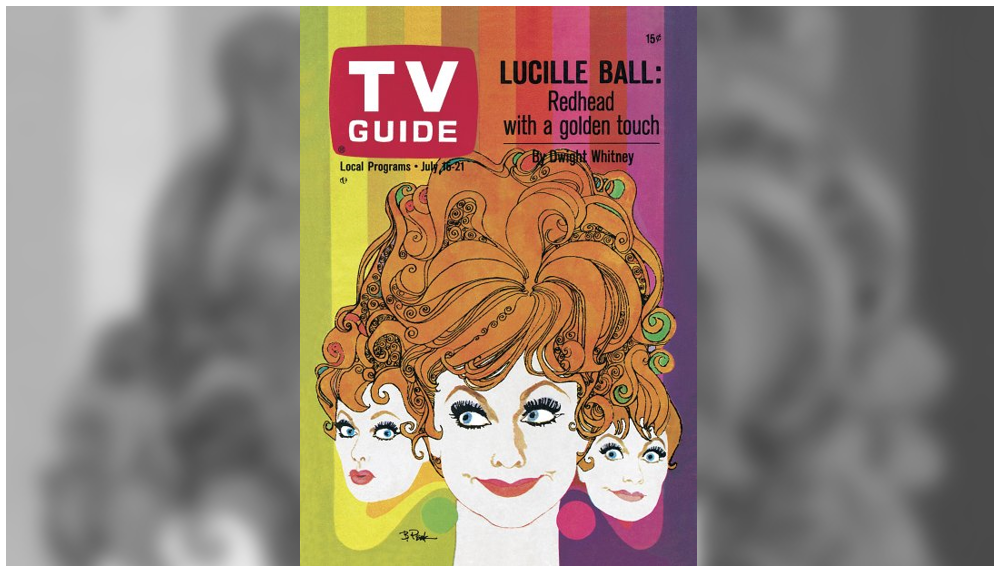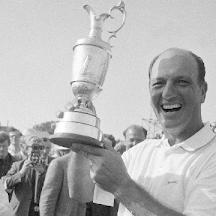This week we've got yet another article telling us how cable television is going to change the industry forever, and we'll get to that in a bit, but this must be the umpteenth time TV Guide has featured one of these stories, and to tell you the truth, there are only so many ways one can go through them and say, yes, this one came true, and no, this one didn't, and this one did but on your phone instead of your TV. And, seeing how I just read something about how more Americans now get their programs from streaming services than cable, it seems as if we're talking more about what was and what will never be.
So instead we're starting off with a look at a man who's always interesting, Steve Allen.
While The Hollywood Palace is on summer break, ABC fills the Saturday night time slot with Piccadilly Palace, a London-based variety show starring the iconic British comedy duo of Eric Morecambe and Ernie Wise. We'll stop in from time to time during the summer months to see who has the best lineup..
Sullivan: In this rerun from Expo 67, Ed welcomes operatic soprano Birgit Nilsson; comic Alan King; singer Petula Clark; the Seekers, vocal group; and choreographer Peter Gennaro, who leads a dance-tour of the fair. Canadian artists: pianist Ronald Turini; singer Claude Leveillee; Les Feux Follets, dance group; and the Montreal Symphony.
I'm not sure we've ever had a Eugene Burdick week here at the blog, but it just goes to show you there's a first time for everything. And before the puzzled expressions you usually have when reading the material here become permanently frozen like some character on The Twilight Zone, I'll explain it all to you.
MST3K alert: Night of the Blood Beast (1958) An alien entity takes control of an astronaut’s body. Is he friend or foe? Michael Emmet, Angela Greene, Ed Nelson, Tyler McVey, Ross Sturlin. (Saturday, 2:00 p.m., KGO in San Francisco) Yet another science fiction movie involving aliens and self-sacrifice, but not quite as good as "A Feasibility Study." In other words, the kind of movie Ed Nelson did before he wound up on Peyton Place. The MST3K version is combined with a really bad short, "Once Upon a Honeymoon," which features Virginia Gibson before she wound up on ABC's Discovery. Well, I guess everybody has to start somewhere. TV
Allen, "the well-known producer, director, actor, comedian, musician, songwriter, sculptor, poet, political theorist, lecturer, biographer and novelist" (in Dick Hobson's words), is being wooed (along with Jackie Gleason and Jack Paar) to return to the late-night wars as host of a new CBS show. He's not enthusiastic about the idea, though, telling Hobson that "(1) I can make a lot more money doing an early-evening show, and (2) it would take too much of my time." Instead, he's content to host the summer replacement Steve Allen Comedy Hour, which gives him the chance to "do satire and social commentary on current events."
In fact, Allen's focus now is on the bigger picture. Asked if he worries about his show's rating, he replies, "I am worried about mankind's rating." He likes the format of his show because it gives him the chance to touch on those issues; "My sketches almost always have a point of view; they're not just silly jokes. We've taken on political extremism, for example, and air and water pollution." He still remembers with distain the time back in 1960, when NBC's Broadcast Standards department "axed as 'too controversial' a serious roundtable discussion of crime and punishment with actors portraying St. Thomas Aquinas, Aristotle, Darrow, Dostoyevsky, Freud, Hegel, Montaigne and Socrates. 'NBC would have preferred that I function in an intellectual vacuum, restricting myself to making audiences laugh rather than think.'" Allen does eventually find someone to take on that idea, though; he's describing Meeting of Minds, which aired on PBS from 1977 to 1981 and rarely failed to fascinate.
Despite his unwillingness to go back to late-night, he does offer a few ideas on what makes a good host. "There may be only four or five guys in the world who can do it," he says (apparently in contrast to the current television fad of thinking that anyone can host a late-night show, and then going on to prove that Allen was right all along). He says there are five keys to success: first, the host has to appear as if he's a non-show-biz type. "The viewer thinks we're just plain folks, just like himself." Second, the audience needs to see you as a good guy. "They should feel toward you as toward a friend. Fast wit and repartee is less important than being likable." Third, "You have to be good at interviewing others and develop the ability to be interested in the person interviewed." Fourth, the host should "be at ease." Bishop, he thinks, isn't there yet. Paar never was, but he was never boring; "his keyed-up-emotionalism made him interesting." Finally (the lesson today's hosts seem to have the most trouble learning), "We shouldn't compete with our guests. I never try to top anybody, especially another comedian."
In the end, Allen successfully wards off CBS's interest in him as a late-night host; they wind up going with Merv Griffin. He does return to the talk wars with a syndicated series in 1968, which ran for three years and was shown at various times of the day in different markets. He writes a successful series of mystery novels in which he and wife Jayne star as fictional versions of themselves, and becomes a vocal opponent of obscenity on television. As I say, always interesting.
l l l
Sullivan: In this rerun from Expo 67, Ed welcomes operatic soprano Birgit Nilsson; comic Alan King; singer Petula Clark; the Seekers, vocal group; and choreographer Peter Gennaro, who leads a dance-tour of the fair. Canadian artists: pianist Ronald Turini; singer Claude Leveillee; Les Feux Follets, dance group; and the Montreal Symphony.
Piccadilly: The rockin’ Kinks and singer Engelbert Humperdinck storm the Palace tonight. Hosts Eric Morecambe and Ernie Wise take to the air in scale model planes, and perform a slapstick ventriloquist act. Millicent Martin, Michael Sammes singers.
To be honest, I was seriously considering dropping the Sullivan/Piccadilly segment, or at least putting it on pause. Piccadilly Palace is much more like, say, The Dean Martin Show than it is The Hollywood Palace, which makes it difficult to get a true matchup with Sullivan. And then I looked at this week's lineup, and decided I owed it to everyone to include a show that has the unlikely combination of Engelbert Humperdinck and Ray Davies and the Kinks! For that reason alone, even though Ed has some big name talent, I'm calling the week a Push.
l l l
I'm not sure we've ever had a Eugene Burdick week here at the blog, but it just goes to show you there's a first time for everything. And before the puzzled expressions you usually have when reading the material here become permanently frozen like some character on The Twilight Zone, I'll explain it all to you.
The feature on Saturday Night at the Movies (9:00 p.m., NBC) is The Ugly American, an adaptation of the novel by Eugene Burdick and William Lederer outlining what they saw as failed U.S. policy in Southeast Asia (remember, this was written in 1958); the movie stars Marlon Brando as an American ambassador who fails to understand the complexity of the situation in the region until it's too late.
Skip ahead to the end of the week, and the CBS Friday Night Movie (9:00 p.m.) is based on yet another Eugene Burdick novel, Fail-Safe, this one written with Harvey Wheeler. The story of an accidental nuclear war stars Henry Fonda as the president, Walter Matthau (in a very nasty performmance) as a neocon political scientists, and Dan O'Herlihy (in a very sensitive performance) as the Air Force Chief of Staff.
Judith Crist calls the pairing "serious melodramas, topical in theme and honorable in intent," but adds that they "give unconventional themes purely conventional treatment." Despite that (and I haven't seen The Ugly American, but I think Fail-Safe is very good), what I wouldn't give to have more theatrical films of a serious bent like these, rather than a steady diet of action adventure and superhero movies.
l l l
Since we've gotten a head start on the week's activities, let's just keep on going.
Remember a couple of weeks ago TV Guide featured the cast of the ABC series The Big Valley on the cover? Well, on Saturday, the seventh annual Captain Weber Days Parade (held in honor of Captain Charles Maria Weber, the founder of Stockton, California) has a trio of stars from the show serving as grand marshals: Lee Majors, Richard Long, and Peter Breck. (6:30 p.m. PT, KOVR in Sacramento) KOVR, by the way, happens to be an ABC affiliate. Coincidence?
And speaking of coincidence, Voyage to the Bottom of the Sea (Sunday, 7:00 p.m., ABC) has a plot that sounds familiar, at least if you read my recent piece on The Outer Limits episode "A Feasibility Study": "An army of rock men attacks the Seaview. The lumbering creatures are commanded by a half-human, half-fossilized madman bent on conquering the world." Frankly, had I seen this earlier, it might have changed my entire understanding of "Feasibility Study." Hmm. . .
On Monday, we have a most interesting cast of guests this week on The Match Game (2:30 p.m., NBC): sportscasters Sandy Koufax, Mel Allen, Curt Gowdy, Kyle Rote and Paul Christman; and former football great Y. A. Tittle. Recognize all of them, and I enjoyed listening to them all. Later in the evening, the same network presents an encore showing of the NBC News Special "Khrushchev in Exile—His Opinions and Revelations" (8:00 p.m.), as host Edwin Newman talks with the former Soviet premier about world events during his time as leader, and the "loneliness and boredom of being banished to oblivion." The documentary was originally shown on July 11, but was pushed out of prime time due to the length of the baseball All-Star Game, a 15-inning affair that ran for more than three-and-a-half hours. By the way, two of the announcers on that game were Curt Gowdy and Sandy Koufax.
Also on Monday, Coronet Blue continues on CBS (10:00 p.m.), which reminds me of a Letter to the Editor this week from Eileen S. Macdonald of New York City, who complains about the network's cancellation of the show without a concluding episode. Her letter, which begins, "I'm so annoyed I can hardly type this letter fast enough," says, in part, "All I can say is that I think it’s a good show, and so does my teen-age son. In fact, we seldom agree on programs and I consider that most of what he watches is junk—that’s why we're a two-set family. Isn’t it time that advertisers woke up and stopped letting the networks push the audiences around?" To that I would say two things: 1) I agree; and 2) Santa Claus and the Easter Bunny aren't real, either. Of course, the story is more complicated than what Ms. Macdonald suggests, but it's certainly unfortunate all-around.
Peter Graves did a lot of B-movie sci-fi before Fury, Court-Martial, and Mission: Impossible, and Tuesday's episode of The Invaders (8:30 p.m., ABC) sounds like it could have been right out of one of them: "The murder of two astronauts prompts David and an Air Force security officer (Graves) to investigate the invaders' interest in the manned lunar program." Joanne Linville and Anthony Eisley guest-star; I'm just sorry we don't get a chance to see Graves's character, wild-eyed, shouting, "You've got to believe me!"
Hands-down, Wednesday's highlight is the KOVR 9:00 p.m. movie, The Third Man, starring Joseph Cotten, Orson Welles, Ailda Valli, Trevor Howard, and Bernard Lee. It's a terrific movie, which spawned both a radio series, also starring Welles, and a television series, with Michael Rennie playing as a reformed Harry Lime after the war. This means that Lime survived that shootout in the sewer at the end of the movie, which might be a stretch, but on the other hand, we never did see Lime actually get shot, did we? And as Welles himself once said, "If you want a happy ending, that depends, of course, on where you stop your story."
Continuing on to Thursday, it's a good night for comedy. At 7:30 p.m., the only regularly-scheduled black-and-white program left on television, The Lucy-Desi Comedy Hour (repeats of the 1957-58 series of specials) airs an episode featuring Lucy's new neighbors, Ernie Kovacs and Edie Adams, and immediately starts wooing Edie to get a spot for Dezi on Ernie's TV show. If you're not a fan of Lucy, then I'd recommend an F Troop repeat (8:00 p.m., ABC) in which Larry Storch plays a dual role: Corporal Agarn and his visiting Russing cousin Demtri Agarnoff. I can imagine just how over-the-top Storch was in this episode, which is why I think it's worth watching. I wonder what Hal Horn thinks of this one?
One of the things I really miss from my youthful sports fandom is the College All-Star Game, the football game that matched the defending NFL champions against a group of college all-stars, played at Soldier Field in Chicago. (Friday, 6:30 p.m., ABC) This game, along with the Coaches All-America all-star game earlier in the month, signaled the unofficial start of the football season. I've written about it before so I won't bore you with the details, but as the Green Bay Packers were my team, you know I was rooting for them here. They'd beaten the Stars 38-0 the year before, and even though this year's All-Star team features Steve Spurrier, Bob Griese, Floyd Little, Bubba Smith, Alan Page, and others, the Packers crush them again, this time 27-0.
l l l
And now that story about cable TV.
CATV, according to Albert Warren, represents "the four letters that have rocked broadcasting." Until recently, cable has mainly brought TV to rural and isolated areas not able to otherwise get a decent signal. (Average cable bill: $5 per month.) But now, it's being rolled out in more metropolitan areas as a kind of test—New York City, for example—where skyscrapers can interfere with clear signals. "The facts are that scarcely anyone in New York can get all nine with the consistently high technical quality CATV [especially color broadcasts] would provide."
One of the beauties of CATV is that there's no technical limit to the number of channels you can transmit through the cable. Most have space currently for 12, but "engineers are working on systems providing 20, 30 or more." The growth of cable is limited for now by the FCC, which narrowly voted to maintain severe restrictions, such as not bringing in stations from distant cities, and not originating its own programming. The rationale is that since local stations require both large viewing audiences and sponsor advertising in order to maintain free program, it would be unfair for them to have to compete with cable. There are also questions about copyrighted material, for which CATV operators say they're willing to pay a "fair rate," but a couple of recent conflicting court cases have suggested Congress will probably have to get involved eventually.
There's plenty of speculation as to what the CATV system of the future will look like: "electronic newspapers, shopping, teaching, voting, surveying, gas and electric meter reading, library research, mail delivery, emergency warnings—you name it. Even now, CATV provides news, weather services and even stock quotations on channels not occupied by local TV stations." (I noticed there was nothing about 24-hour sports networks, but then who could possibly be interested in that?)
There's more, but I think you get the gist of it. One of the intriguing footnotes is that all three broadcast networks have "dipped their toes" in the cable pool; "ABC was hot about CATV for a while, but it marked time while the FCC considered its merger with ITT. CBS has been quietly buying systems—but all in Canada, to gain operating experience while avoiding the complications of U.S. ownership. NBC has bought a couple of small systems, also for toe-dipping purposes." Today, of course, NBC is owned by a cable system, Comcast, and each network is involved, in one way or another, with streaming services. We've already passed throught the expansion of cable and now we're seeing its contraction. As for what comes next, I think one would be a fool to even try and predict what even the next few months have in store. But it's safe to say that those four letters rocking broadcasting have been replaced with three words: Cut the Cord.
l l l
Some assorted notes to round out the week: this week's "As We See It" concerns CBS's recent inquiry into the Warren Report on the assassination of President Kennedy. Running for an hour each night for four consecutive nights, June 25 through June 28, the editors call it "a major journalistic achievement," revolutionizing the way such information is presented by spreading it out over multiple evenings rather than telling it all in a three- or four-hour documentary. The content was "supurb" as well, "a masterful compilation of facts, interviews, experiments and opinions—a job of journalism that will be difficult to surpass." Most important, the shows were a ratings hit, beating almost every show that was scheduled opposite it, and proving that "[w]hen serious programs that interest them are scheduled during prime time, viewers will tune in." Would they do so today? Well, it depends on whether or not you think we're still a serious people. I remember my seven-year-old self being fascinated by this, but then I always was precocious.
A sign that cooler heads have prevailed is evident in the Hollywood Teletype, which reports that "the idea of having a girl for Leonard Nimoy in Star Trek has been abandoned." It's also a sign that there was some level of insanity in the NBC executive offices to even consider such a thing. I guess not everyone back then was "serious."
Finally, there's that cover picture on the stars of The Rat Patrol. As you may recall, that show was a favorite of mine when I was growing up, but took a severe dive upon rewatching last year, enough so that it's now on the resell pile. But it's worth a mention that the feature is a profile of Gary Raymond, the English actor who plays Sergeant Moffitt, the most likeable of the four members of the team. And, according to Leslie Raddatz's story, he seems like a pretty good guy. Glad to hear it!
l l l


